We are a culture distracted. I want to share a few examples of how communication technology is reshaping our culture, reshaping media, and reshaping productivity and identity.
I observe these changes every day, and am beginning to see connections. Here are just a few examples of mobile phone use in everyday situations:
- Employees texting or receiving phone calls while serving customers

- Mail carriers making their way through neighborhoods, while chatting on the phone:
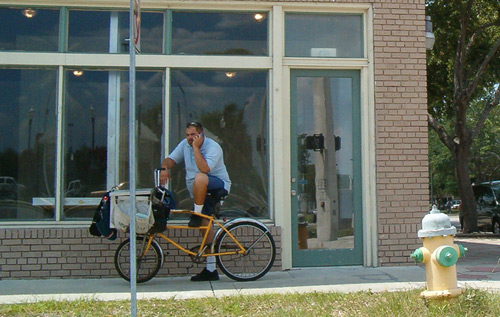
- Employees focusing on personal communications, not the environment around them:

- People on public transit occupied on mobile devices instead of reading newspapers, or even glancing at those around them:
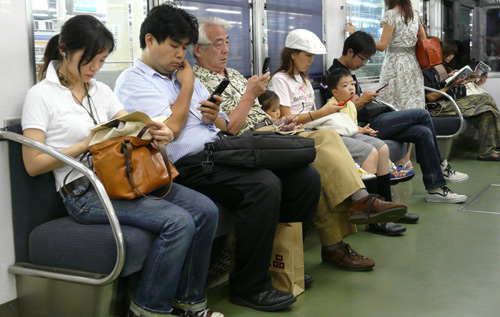
- Friends at a cafe focused on communicating with those who aren’t at the table:
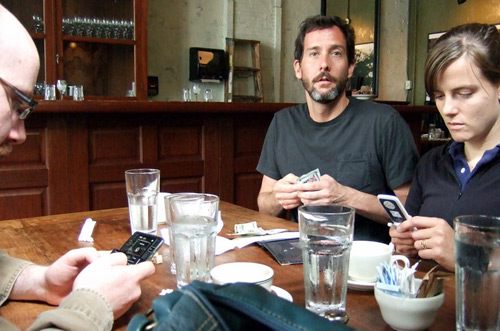
- Walking and texting while crossing the street with a baby stroller:
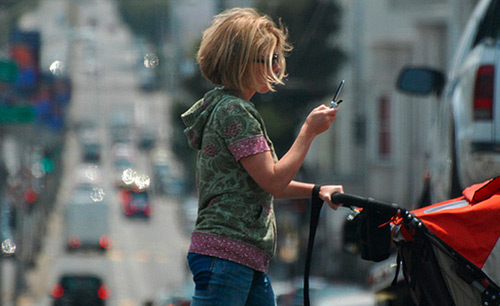
- Audience members at a conference can tune out the speaker and their colleagues on a whim via mobile devices:
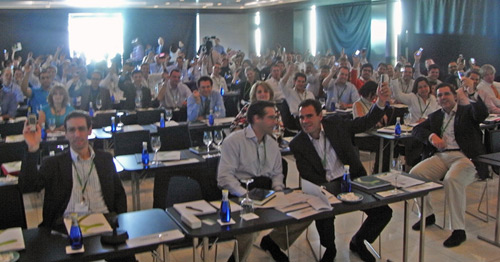
- Business meetings are filled with people only partially there:
- Personal connections interrupted and reprioritized:

- An all too familiar site: texting while driving:

- Is the customer smiling at you, or reacting to the person on the phone? How can businesses make connections with customers in an environment like this?

- Even in paradise – how do we truly escape?

It is easy to see these uses of mobile devices and shrug that they are normal. But let’s consider how they affect businesses and communities:
- Customer Service
Why worry about customers and strangers if you can be talking to your friend? Even when I go to my local foodstore, the person ringing me up may sneak text messages, and the guy collecting carts in the parking lot may be on his cell phone. As this behavior becomes more normal, workers ask themselves: why ever be disconnected? Why put yourself in an unfamiliar situation? Why talk to a stranger (eg: customer) when you can talk to a friend? Why invest yourself in your job or anything where rewards come slowly?This has a profound effect on customer service. Employees become less aware of needs of customers, less available and willing to help, more likely to make mistakes, and less likely to go the extra mile. A moment of downtime is no longer an opportunity to do extra work that benefits the company and their career – it becomes a moment to check in with friends and interests.
- Your Company’s Productivity
Moving outside of the retail environment, these same effects translate to the business environment. Employees are inundated with streams of information and communication. What’s interesting is that some of them can even be considered business-related or quasi-business related.Meetings that are supposed to be focused and quick with clear goals, might turn into a room of people sneaking a glance at their Blackberries, and diverting their focus to keeping up with other streams of information.
Even if a company wanted to take a hard line with this issue, banning Facebook, Twitter or Blackberries isn’t the solution. Employees might be connected to customers on Facebook, and use it as a loose customer relationship management tool. Twitter streams could be filled with information that shapes the goals and priorities of your brand. Twitter can also be a 24/7 marketing tool that becomes useless when relegated to specific times of use.
- The Attention of Your Industry, Customers, and Potential Customers
What’s more, companies have to realize that this is not just an internal struggle – these same behaviors are occurring with business partners and customers. A fragmentation of attention that affects not just productivity, but their awareness of messages you are targeting them with. You are just another of many streams of information in their life. Your products and services that they are using might see less attention, and over time, experience less appreciation. It may become a commodity in an increasingly busy life. - Events
Perhaps you host events for your industry, or are an active participant in those that exist already. While little else can replace an in-person connection, I am constantly seeing this benefit be re-prioritized by attendees. People can feel social and in-touch through their mobile device, giving an excuse to avoid those awkward social moments that remind us of the first day of school.Why introduce yourself to the strangers sitting next to you at a lunch break, when you can reinforce your identity and comfort level by checking communication streams on your mobile device?
Audiences watching speakers or panels are lit up like a Christmas tree, with people active on laptops and mobile devices. Absolutely, some are Twittering, taking notes, reporting and looking up associated information. But at less engaging sessions, you see people wander off to check other communication streams, do other work, and even play games.
From a speaker’s perspective, they can be staring out at a sea of people looking down at their laptops and phones, never making eye contact, and rarely reacting. How can they clap if they are always typing?
- Interpersonal Relationships
As companies work to develop teams and talent, it can be difficult to truly bring a group together that feels a sense of identity and a level of focus on the corporate goals exclusively. Clearly, people are focused on their jobs and the company they work for, but many companies operate in little silos, and now employees have the option to follow suit.Networking opportunities can be easily found on their mobile device, not exclusively through company-sponsored programs, that include company-sponsored goals.
- Creativity
I have been fortunate enough to have spent my life around artists, writers, musicians, product designers, and many other creative people. My wife has degrees in toy design, illustration and art education, and has an art studio at home, which allows me a fascinating daily view into the creative process of an artist.But creativity is not relegated to these roles alone – accountants need to be creative; lawyers need to be creative; human resources executives need to be creative; information technology workers need to be creative; this is a characteristic built into most jobs at some level or another.
There are two ways that communication streams through a mobile device can affect the creative process. First, the ability to become engrossed in the task at hand. Constant distractions brings a circular process of engaging and reengaging with the problem you are trying to find a solution for.
Second, many employees now have the ability to express their creativity through personal avenues through their mobile device. This siphoning off of creative energy could leave work a more boring place, with less innovative ideas. As regular people find cool things to do on Facebook, Twitter and the mobile web as a whole, they feel less of a priority to judge their creative output within their career alone.
- Creation vs Consumption
But this creative siphoning isn’t just happening with employees – it’s happening with customers and business partners. People have compelling tools at their disposal to develop their creative side. This could leave less patience with products or services that don’t immediately capture their attention, leaving a business with less engaged customers, less likely to learn the ins and outs of the products & services they provide. - Information Overload
In May I talked about information streams and the stress that it can have on our lives. It is now possible to go into a store and find a stressed out sales person because he just got a text from his friend, his wife called twice, he’s trying to keep up on baseball scores, and oh yeah, he has to deal with customers. - Loyalty
It could be argued that an employee who is connected to so many worlds never has to fully embrace a particular job or business. It’s not that people will treat their careers flippantly, but you could find that there are fewer barriers that kept people aligned to one company.It is easiest to see this with a group of teenage trainees at a fast food restaurant, each preferring to be doing other activities. But as these communication devices become more powerful, people’s "other" lives follow them everywhere, making it easier and easier to never fully commit.
This quote by Clay Shirky is a double-edged sword, when you consider the issues above:
"The moment we are living through is the largest increase in expressive capability in human history."
And while I paint a disruptive picture above, I feel that the opportunities far outweigh any negative effects.
When considering how you serve your industry, how you can grab the attention of prospective customers, inspire your staff, or find other ways to solve people’s problems, you need to factor in the ways mobile devices are reshaping our culture. You can’t fight these new behaviors, you can only adapt to turn them into opportunities instead of barriers.

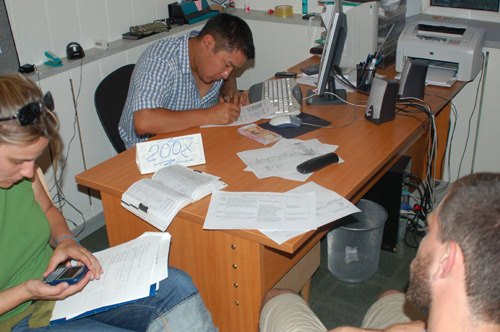
Awesome photos. Great points. Keep up the good work!
I was amused by the photo with this caption, “occupied on mobile devices instead of reading newspapers” because I ride public transportation every day in San Francisco and prefer reading a the content of a newspaper on one of my mobile devices instead of holding a large chunk of paper. It's easier to read the NYtimes on a mobile device while standing on a streetcar than to hold onto a huge paper — also nicer than slapping the person next to me when turning the page in a physical paper.
Good point, I do the same thing when I take the train into the city. At home, I love the paper version of the newspaper, but when traveling, it is loud, dirty and big. There, I said it.
Thanks.
Thanks!
Title should be “The Effect of”.
And the public transportation one was happening for decades before cellphones came on the scene.
Thanks – I just made the correction in the title of the post. For your public transportation reference, do you mean that people have been moving away from reading newspapers on buses & trains for decades? In my experience, I have watched mobile devices take over people's attention on the train over the past ten years, and I have spent a lot of time on commuter trains. Certainly, it is not the only thing effecting behavior on public transportation, but in my experience, it is a major one.
Thanks again.
-Dan
that first picture is out of context, if you read the caption on Flickr, the customer in line handed their phone to the employee behind the counter to take an order from another person over the phone. I've seen this at subway too.
Eric – You caught me! I saw that caption, but couldn't find another photo of an employee sneaking a text message at the counter. I've seen it at my local foodstore, but its a very sly thing, hard to capture in a photo.
Thanks for keeping me honest!
-Dan
I agree with the comments regarding the metro. I use my mobile device while riding the train in SF to read news and webpages, blog (sometimes about things happening around me), and go through my email. That's not exactly a bad result of the devices.
I do believe that a new etiquette is required for their use. However, I won't be the first to have experienced a woman thinking you are trying to hide who is calling you if you don't answer in front of them! This in regard to “personal connections interrupted and reprioritized.” I always try to let it go and call back later. If I'm expecting an important call, I let the other person know in advance to set expectations. Yet, this case is rare, as most time issues can wait until I'm available again.
Very interesting post!
I shocked when i saw your report…but it rights that people give more attention on there phone rather than other.everywhere you find mobile either in transport,meeting ….more.some times its create problem but people don't take any precaution
Thanks for this; inspiring!!
Carlos – Thanks! For many of us, there are so many data streams coming in through a mobile device, it's hard to think of it not becoming a willful interruption in almost any activity. Oh well, that's progress I suppose!
Have a nice day.
-Dan
Thanks David!
Not to be that guy, but just how did you capture the photo of texting while driving? Reminded me of news segment on distracted driving where the reporter gave most of his report talking into a dash mounted camera rather than focusing on driving himself. Otherwise great article. Oops, light is turning green gotta go!
Dan, you hit the nail on the head. I for one am tired of waiting for an employee to finish texting before they will help anyone, and am amazed that employee gets annoyed when having to do so. Our society is becoming more and more socially inept, due to people relying upon texting, vm amd e-mail to do the talking for them. It's sad, and I wish people would wake up, start paying attention to those around them and put away the blackberry…at least for a little while. I mean come on, do you really need to text someone while in the bathroom? I think not…
The one you label as a business meeting seems to actually be a legislative body of some sort=- particularly sad, since their business is supposedly important, and the taxpayers are paying for it to the tune of a pretty penny, but the legislators aren't even there. Or maybe this one is getting last minute information on a bill?
Hi Brad – I got it off Flickr! Funny though.
Erin – it's definitely a double-edged sword. In one way, we communicate more than ever with those we care about. In another way, we fail to create new friends and communities by focusing only on our own little worlds, not the moment we are in. Fascinating though!
-Dan
Good catch – but luckily, they were on break at the time. If you click the photo, you can see the original photo with a note stating such. Whew!
-Dan
Great article!
When I looked at the photos, I realised that as a culture we now struggle to do just one thing at a time. Why serve a customer when you can serve a customer and talk to your friend? Our attention is split. We drive and phone. We're in a meeting and we text. The first thing we're doing suffers because of our split attention. Some activities suffer less (e.g. sitting on the train), but even then, opportunity to meet strangers and engage with those around us suffers too.
So true. I've been interested in the “slow movement” that people talk about in books. Living in New Jersey, I don't think that movement will ever really take hold here though!
Have a nice evening.
-Dan
I love the collection you've assembled. It is interesting how people pause current social interaction to have low-bit audio interaction with someone in a different place. It's mad to try and imagine a world pre mobile.
Agreed!
Great observations. Many of those things have crossed my mind many times. Perhaps I'm old-fashioned, but I still feel rude if I answer my phone while out with friends.
Scared for the day they start messaging while clerking in my area, they already move incredibly slow.
One wonders if ADD will be the norm in the future?
Thanks. What's interesting is if you watch younger people when out with friends (teenagers, college students), oftentimes the mobile phone is HIGHLY integrated into their socialization. A group is walking around, each on the phone or texting – always planning and expanding. It's not necessarily a bad thing – just interesting.
Have a nice day.
-Dan
I agree with each points in this article.
It really changes the life and culture of the humanity with the use ofcell phones, but then it could make easily do our daily task.
FUCK YOU
I’m sorry